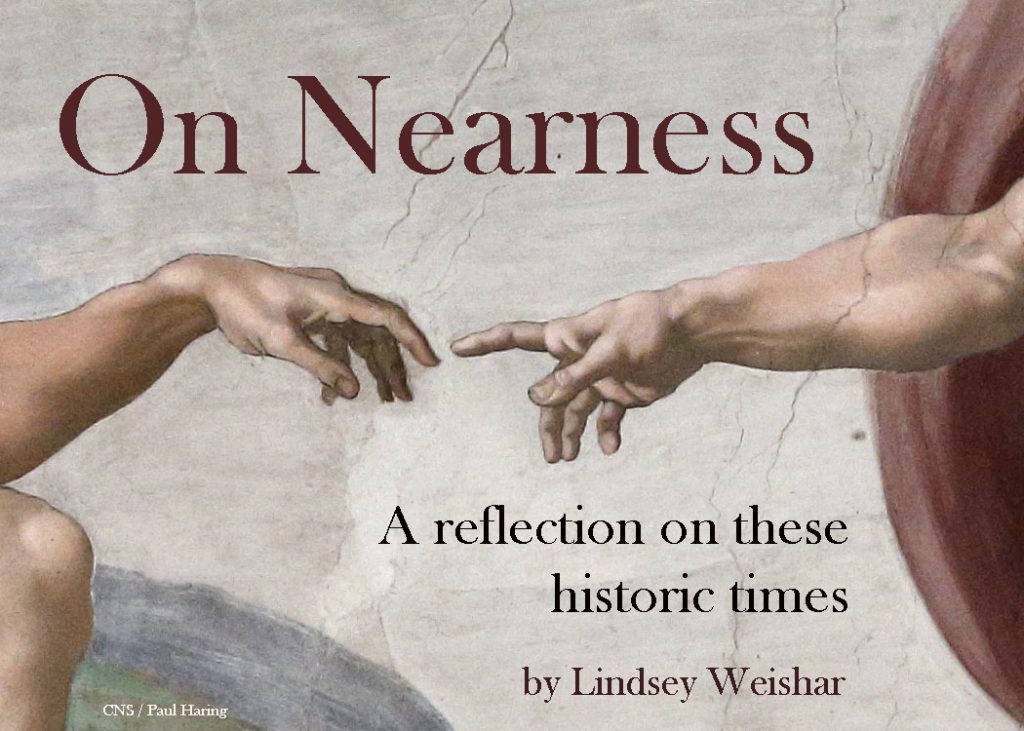Jesus knows our longing for Him, and is still lovingly present in our uncertainty

The artwork is from "The Creation of Adam" by Michelangelo in the Sistine Chapel in the Vatican Museums.
By Lindsey Weishar
I discovered the news on Facebook two hours after it broke: all Masses canceled in our diocese. I was sitting in a friend’s kitchen, and we just looked at each other, mostly silent, trying to conjure up something to say besides, “This will be hard.” I was sipping tea from a heart-shaped mug my friend had gotten at a Chicago Christkindlmarket. Inside the cup were two words: ich liebe. We had looked up those words the night before as we put together a pot pie. Ich liebe –– I am in love.
Those words echoed through my mind as I read the letter Msgr. Stanley Deptula sent to members of St. Matthew Parish in Champaign. He began the letter with this: “Your priests love you.” The decision to suspend all Masses on Friday, March 13, was an act of love. Through our faith, we know that to love is to risk being hurt, and I do admit that even the idea of not being able to receive Him hurt.
The most fearful thing about this virus for me has been the call to hold people at a distance.
The most fearful thing about this virus for me has been the call to hold people at a distance. As one Catholic radio personality said recently, “Now is not the time for touching.” As a single person, I can inadvertently go for days without human touch. Only recently has it struck me that not only is community with others something I desire; it is something I need.
What Mass provides is an anchoring. If nothing else, for one splendid hour I will be in the presence of others, this very human body of Christ with all its aches and pains and joys and hopes. It is good to acknowledge this longing to return together — to be touched by Him as he enters our individual bodies and slowly but deeply transforms our hearts.
And yet, it is in the loss of being able to receive Him that I uncover this longing, a longing that needs to be stripped of its “Well, this is just what I do every week,” undertones. So often I arrive at Mass and bury my head in a bouquet of worries I’ve not been able to acknowledge until the familiarity of the liturgy unfolds over me. It is good to be able to share worries with Christ, but so often I pray like He’s not there — my “conversation” with Him an elaborate monologue. Like Mary Magdalene on Easter before Jesus speaks her name, I do not always see Him amid the myriad details of daily living: the heartaches, the headaches, and even the joys.
I had thought this loss of being able to receive Him bodily in the Mass would mirror Holy Saturday, but the truth is that Jesus is still present — in our churches, in each other, and in us.
I had thought this loss of being able to receive Him bodily in the Mass would mirror Holy Saturday, but the truth is that Jesus is still present — in our churches, in each other, and in us. Though true that we cannot draw together in the same way, it is He who holds us together in this uncertainty, He who continues to utter to us, Ich liebe. I am in love with you. My prayer is that we cling to this certainty that Msgr. Deptula laid out so clearly — we as the body of Christ are loved. As the Church works to care for the members of this body who are most at risk of contracting this virus, we are still connected from afar. He is still near.
It struck me that for the March 15th weekend, both the first reading and Gospel were about thirst — the Israelites’ and the Samaritan woman’s. In this time where we are encouraged to make spiritual communion, may our hunger and thirst for Him increase. As Msgr. Deptula said to us over the streamed Mass in which many of us participated, His hunger and thirst for us is infinitely more.
St. John Paul II composed the following poem and it is a reminder to me that Jesus knows our longing for Him. If you feel at all distressed about not being able to receive him in the Eucharist, I’ve found it a comfort to know that he knows our thirst.
MAGDALENE — By Pope John Paul II
The spirit has shifted, my body remains
in its old place. Pain overtakes me
to last as long as my body is growing.
Now I can give it food from the spirit
where before there was only hunger.
At times love aches: there are weeks, months, years.
Like the root of a dry tree my tongue is dry
and the roof of my mouth. My lips are unpainted.
It takes long: Truth sounding out error.
But it is He who feels
the drought of the whole world, not I.
—
 Lindsey Weishar enjoys traveling, exploring the origins of words, and reading. A graduate of The High School of Saint Thomas More in Champaign, she holds an MFA in Creative Writing and currently works as an English language and adult literacy instructor in the Kansas City region.
Lindsey Weishar enjoys traveling, exploring the origins of words, and reading. A graduate of The High School of Saint Thomas More in Champaign, she holds an MFA in Creative Writing and currently works as an English language and adult literacy instructor in the Kansas City region.





